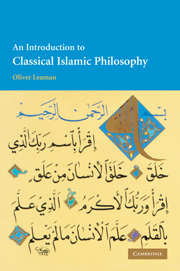Book contents
- Frontmatter
- Contents
- Preface to the first edition
- Preface to the second edition
- List of texts and abbreviations
- Introduction
- PART I AL-GHAZĀLĪ'S ATTACK ON PHILOSOPHY
- 1 How did God create the world?
- 2 Immortality and the active intellect
- 3 Can God know particulars?
- PART II REASON V. REVELATION IN PRACTICAL REASONING
- Further reading
- Glossary
- Index of passages
- General index
1 - How did God create the world?
Published online by Cambridge University Press: 05 June 2012
- Frontmatter
- Contents
- Preface to the first edition
- Preface to the second edition
- List of texts and abbreviations
- Introduction
- PART I AL-GHAZĀLĪ'S ATTACK ON PHILOSOPHY
- 1 How did God create the world?
- 2 Immortality and the active intellect
- 3 Can God know particulars?
- PART II REASON V. REVELATION IN PRACTICAL REASONING
- Further reading
- Glossary
- Index of passages
- General index
Summary
Religious texts which are designed to serve as the very basis of faith rarely incorporate philosophically or scientifically exact statements concerning the creation of the world, and Islam is no exception here. The Qur'ān makes several quite definite claims about the nature of the creator of the world and of the manner of its creation, yet these statements do not point unambiguously in just one direction. In the Qur'ānic description of God there is no doubt according to the Ash'arites that he is represented as superior to all his creatures, that he is the only God and that there is nothing in the universe upon which he is dependent. He is self-sufficient and has no need of human beings; he could do away with us and replace the world with something else without as a result ceasing to be himself. He need not have created the world, and now that it is created he could ignore it if he wanted to. We are told that God did create the world, that he is the origin of the heavens and the earth, that he created night and day, the sun, the moon and all the planets. He brings about the spring which reawakens nature and gives to gardens their beauty. Fortunately, for human beings, God designed nature and all his creation for our benefit, although he need not have done so, and all he ‘requires’ in return is prayer and adoration.
- Type
- Chapter
- Information
- An Introduction to Classical Islamic Philosophy , pp. 41 - 106Publisher: Cambridge University PressPrint publication year: 2001



